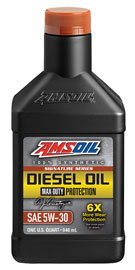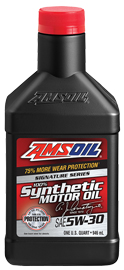Can Diesel Oil be used in Gas Engines?
The simple answer: Yes, you can use diesel oil in a gas engine, provided the diesel oil meets the appropriate specifications and viscosity requirements of your gasoline engine.
For example, if your gas engine calls for a motor oil that meets the API SN specification, you can safely use a diesel oil of the correct viscosity that meets the API SN spec. For the typical gasoline application, a diesel oil isn’t required and the more appropriate choice is a quality gasoline motor oil for both performance and value.
The detailed answer: It’s common for some owners of modified gasoline-powered vehicles to favor diesel oils over their gasoline counterparts.
Many assume diesel oils are more durable and more capable of withstanding the increased heat of a powerful, turbocharged engine.
Others lean toward higher-viscosity oils to protect against wear, and it’s sometimes easier to find a 40- or 50-weight diesel oil than a gasoline motor oil. Others favor the increased detergency of diesel oils. I hear that one the most.
While you can use diesel oil in a gas engine, provided it meets the appropriate specifications and viscosity requirements, there’s far more to the topic than that, as I learned after talking to Mark Nyholm, AMSOIL Technical Product Manager – Heavy Duty.
Can diesel oil safely be used in gas engines?
Read the label to determine that particular product.
Nyholm: It depends on the specifications the diesel oil carries and the recommendation of the original equipment manufacturer (OEM).
The American Petroleum Institute (API) publishes its “C” category of specification for diesel oil (currently CK-4) and its “S” category for gasoline motor oil (currently SN). It’s common for today’s diesel engine oils to carry both the API CK-4 and SN specifications.
Though they’re truly designed for diesel applications, they can be used in gasoline applications for those drivers who want to use one oil in all applications. If the diesel oil carries both specs, feel assured the oil is safe to use in diesel and gas applications. If the diesel oil does not carry the “S” category, I strongly recommend against using it in gasoline applications.
Shop AMSOIL Synthetic Diesel Oil
Why do some motorists favor diesel oil over gasoline motor oils?
Nyholm: There are many reasons people choose the oil they use.
Since oil is not top-of-mind with many motorists, it’s typical for people to purchase based on viscosity alone. Many gasoline engines today call for 5W-30, with more and more requiring 5W-20, meaning those viscosities are typically what’s readily available. So, if you’re looking for a 5W-40 or 15W-40, it’s often easiest to find that viscosity in the diesel engine oil aisle.
Others use diesel oil under the assumption it’s a more “heavy-duty” product and must be better than gasoline motor oils.
They may have been told diesel oil is formulated with special components not available in gasoline motor oils, such as more robust detergency additives to handle the soot inherent to diesel engines. In their minds, diesel oils are analogous to better protection.
Shop AMSOIL Synthetic Motor Oil
Do most gasoline engines really need some of the additives in most diesel oils?
Nyholm: Diesel and gasoline oils are formulated with a variety of additives that improve wear protection, corrosion protection, resistance to foaming, viscosity retention and more. Whether the application is gasoline-powered or diesel-powered, many of the same additives are used based on what we are asking them to do in the formulation.
Now, there are additives designed to manage the byproducts of combustion, and some of those byproducts change, depending on whether you’re burning gasoline or diesel. If you’re running a gasoline engine, it’s best to use an oil that contains the correct additives to handle the byproducts of gasoline combustion. The same holds if you’re operating a diesel engine.
When should someone use diesel oil in their gas engine?
Nyholm: If your gasoline engine is heavily modified to put out more horsepower, using a diesel oil can be beneficial. It’s likely modified engines will need a higher viscosity to withstand the increased stress. You can turn to diesel engine oils for those needs or you might want to consider a racing oil, depending on your engine modifications and lubrication requirements.
Many times the engine builder will help provide insight as to what success they have found. Outside of that, if you have a bone-stock gasoline-powered application it’s best to stick with a gasoline motor oil.
They are designed for that type of application and have the components required to manage that engine. Sure, you can run a diesel oil in a gasoline engine; however it’s likely the formula has additional components your gasoline application doesn’t require, which might end up costing you more money.
AMSOIL formulates a complete line of gasoline and diesel oils for nearly anything you have. They’re dialed in to deliver outstanding protection for their intended applications. Consult the AMSOIL product guides for recommendations for your vehicle.
Find AMSOIL Products for Your Vehicle
Synthetic Warehouse Note: Mark forgot to mention in this last section a popular need for diesel in gas engines are customers who want one oil for their business or fleet. AMSOIL has products marketed for one size fits all. One popular is our first product which is excellent for RV’s motorcycles and fleets – the AMO 10W-40. Another is a 5W-30 which makes a lot of sense and is in the Signature Series Diesel line – the DHD 5W-30 which is great for classics, Ford diesels, cars, mowers and equipment. Excellent for golf courses.








